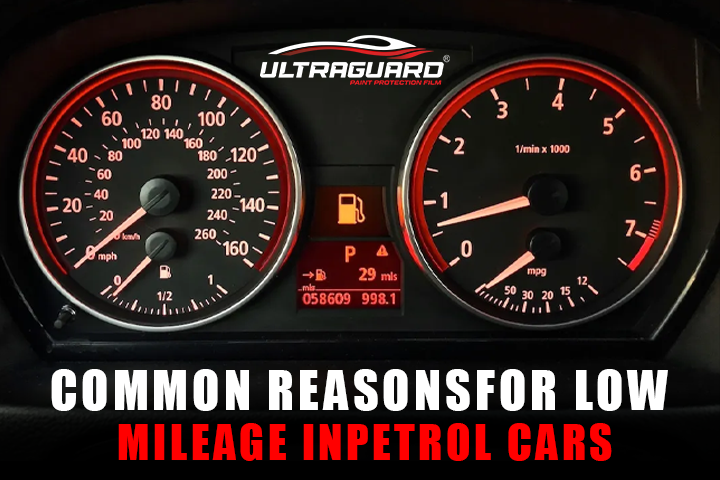Since I write a lot of automotive content, I know many drivers who are frustrated at the sight of their reliably fuel-efficient car consuming petrol almost at an unprecedented rate. The abrupt decrease in kilometres per litre (km/L) is not only an inconvenience but also a wallet killer and an indication of the fact that your car is not working as it should.
The most fundamental step is the understanding of the root causes. The common reasons for low mileage in petrol cars are rooted in minor alterations in your driving pattern or major issues arising behind the scenes, out of the mechanical flaws in your car. We have broken down below common reasons for low mileage in petrol cars and given practical solutions to ensure that you achieve stupendous mileage.

Common Reasons for Low Mileage in Petrol Cars
Here are the common reasons for low mileage in petrol cars:
Why are Petrol Cars Getting Low Mileage?
The fact is that low mileage is not often the result of one disastrous failure. Rather, it usually reflects the end result of minor, fixable problems. The following are the common reasons for low mileage in petrol cars, classified to be clearly diagnosed.
Do You Burn Excess Petrol in your Driving?
The top number of fuel killers is aggressive driving. Repeated, brutal acceleration, overspeeding, as well as braking and forcing your engine to surpass the RPM range of optimality. In addition, excessive engine idling (when the engine is running but not moving) burns fuel unnecessarily as it advances no distance. Accelerate slowly, expect not to stop unexpectedly and turn off your engine.
Would it be because I am consuming much fuel due to my negligence in the maintenance of my vehicles?
The other reason which contributes to low mileage in petrol-powered vehicles is that the engines are not maintained, thus limiting their efficiency directly.
- Under-Inflated Tyres: This is caused by low pressure, and the rolling resistance to the road is greater, resulting in the engine using more power (and fuel) in order to maintain the speed.
- Dirty Air Filter: An air filter that is blocked restricts the flow of air in the inlet and the unidentified residual and petrol mix up to create an ineffective fuel-rich mixture.
- Bad Spark Plugs: Broken / or out-of-spec spark plugs provide a low spark, resulting in incomplete combustion and wastage of fuel.
So stick to a schedule of regular maintenance. Check the tyre pressure at least once a month and inflate them to the suggested PSI that the manufacturer recommends (stamped on the jamb of the door on the driver’s side). Also, make sure that you have cleared your air filter and the spark plugs and changed them accordingly as required in your car manual.
Is it because of bad Sensors or Engine Parts?
The air-fuel mixture in the engine is delicate; therefore, when the relevant parts fail, the mixture is faulty, which is another reason that makes petrol cars achieve low mileages.
- Failure of Oxygen (O2) Sensor: This is a sensor which measures the air-fuel ratio. The bad O2 sensor may cause the engine to malfunction, whereby it injects a lot of fuel, which significantly lowers the amount of miles.
- Leaking Fuel Injectors: A small leak in the fuel system is an indication of the wastage of petrol or combustion of the fuel incorrectly.
- Poor Wheel Alignment: Tyres have to drag as a result of poor alignment, leading to resistance and more fuel consumption.
As soon as you discover that there was an abrupt and drastic decline in the mileage or the Check Engine light appears, notify a reliable mechanic. Sensors and injectors diagnosis and repair are necessary tasks of professionals.
Is the Weight in My Car hurting Mileage?
Pushing the mass of the car is the push of an engine; therefore, this is how it becomes one of the common reasons for low mileage in petrol cars. An additional weight of 50 kg reduces the efficiency of the engine and proves to be unnecessary. This consists of heavy objects that are left in the trunk or the roof rack, that is stuck in place.
Clean up your car occasionally. Clean out any bulky objects- tools, sports gear, too much clutter- that you don’t even need in your daily drive.
What Can I Do to Improve the Mileage of My Car?
Fuel efficiency is the act of making your car better and better, and you, as a driver. These tips will ensure that you will squeeze every litre of petrol.
Which is the most Fuel-Efficient Technique of Driving?
The idea is to continue the drive and continuity. Accelerate gradually and unnecessarily increase and decrease speed.
- Peep over the road in advance of traffic lights and curves. Rather than accelerating and stopping, take your foot off the accelerator and let the car run.
- In a manual transmission, elevate the gear as soon as possible with no lugging of the engine (around 2,000-2,500 RPM of most petrol cars). Let the transmission shift itself in automatics. Despite the uniqueness of each of the cars, the maximum speed of most petrol engines is the top gear of 60-80km/h.
How to Use Air conditioning to save Fuel?
The engine powers the air conditioning, and it burns a lot of fuel.
One should roll the windows when there is low traffic in the city and the speed is not very high.At highway speeds (over 80 km/h), the aerodynamic drag of open windows is higher than the load imposed by the AC, and in this case, it is more economical to close the windows and have the AC on a medium setting.
Even when your car has been parked in the scorching sun, first open the super-hot air in your car by rolling down the windows for a minute, then switch on the AC.
What is the Assistance of Car Protection with Fuel Economy?
Although internal maintenance is important, external protection can also be of less obvious fuel economy benefits, especially in hot weather.
With high-quality heat rejection solutions, you will be able to lower the temperature inside your parked car by a long margin. As an example, an excellent quality Paint Protection Film or even better Paint Protection Films such as Ultraguard Paint Protection Film not only ensures that the paint is not scratched or oxidised, but it may also be used along with high-quality window films which block excessive amounts of IR and UV heat.
Going cooler by default in the car will make you use less air conditioning, thereby loading down the engine and, thus, increasing your fuel economy. The finishes on a car are preserved, and it also has a high gloss and a well-protected finish, which does add a slight aerodynamic advantage to a rough-looking oxidised surface.
Psychology of Fuel-Saving
Mechanics in the car matter, but the engine that is the most effective in saving fuel is your brain. Most of the drivers become victims of traffic myopia- they can only see the car in front of them. High mileage is the foe of this reactive driving. Rather, predictive driving is practised. Look three or four cars ahead. When you notice that the brake lights are well ahead of you, then you can with ease take your foot off the accelerator and coast without causing hard braking. This makes driving a game of momentum and not a game of starts and stops, bringing the demand spikes that burn petrol to a minimum. It is a smoother, more secure, and much cheaper method of travelling.
Strategies to Make Our Cars More Fuel Efficient, Beyond the Daily Drive
At last, we will see the big picture. Do you make the right choice of fuel in your car? Always employ good quality petrol in the reputed stations. Although a few cents more per litre, the cleaner burning characteristics and supplements of the premium fuel can maintain your injectors and fuel system in better health, resulting in maximum performance and economy in the long run, and even give a better km/L average, making the high cost worthless. Besides, it is essential to plan routes. Have GPS applications not only to give directions but also real-time traffic information. The long route that does not involve stopping and going through congestion is, practically, more fuel-efficient than the shortest route full of traffic lights and bumper-to-bumper exasperations. Your mission must be to continue running at a steady medium pace.
Conclusion
Getting the common reasons for low mileage in petrol cars is not only about lowering the fuel bills, but also ensuring you are getting the maximum out of your car. A combination of intelligent driving skills, following a proper maintenance routine and maintaining all the parts, including the protective covers on the body of your car, like the Ultraguard Paint Protection Film, in their optimal condition, will help you to cease wasting petrol and begin enjoying a smoother, cheaper ride. To know more about it, contact us at +91-93-10000-356. Any minor CKD will result in great savings and a healthier car.
Frequently Asked Questions- (FAQs)
Q1. What is the predominant cause of low mileage in the urban area?
It’s your right foot! Slamming on the brakes and hard acceleration. You are losing all the steam you have just paid money for. Cruise–coast to each way station.
Q2. Are mildly soft tyres that important?
Yes, they matter a lot. You have low-pressure tyres, and they drag like crazy. Check your PSI each month- it is the simplest way to save between 4 and 6 per cent of your fuel.
Q3. What is the rate of the first-class gas mileage?
Stick between 60 and 80km/h in pinnacle equipment. Above 90 km/h, the air resistance is against you, and you lose your mileage very quickly.
Q4. Would I get very expensive petrol to go and buy gasoline?
It will only do so when your car demands it! The quality of gas, particularly, is designed and used to keep your injectors smooth, and therefore, you will see your car carrying on with the same excellent fuel efficiency over the years.
Q5. What is my preferred frequency of changing my air filter?
Every 10,000-15,000 km. A dirty filter literally suffocates the engine and causes it to consume more fuel to make up for it.
Q6. Shall I loiter or simply cut the engine off at the light?
Turn it off! In case you are going to be held up for more than 30 seconds, always turn it off.




0 Comments